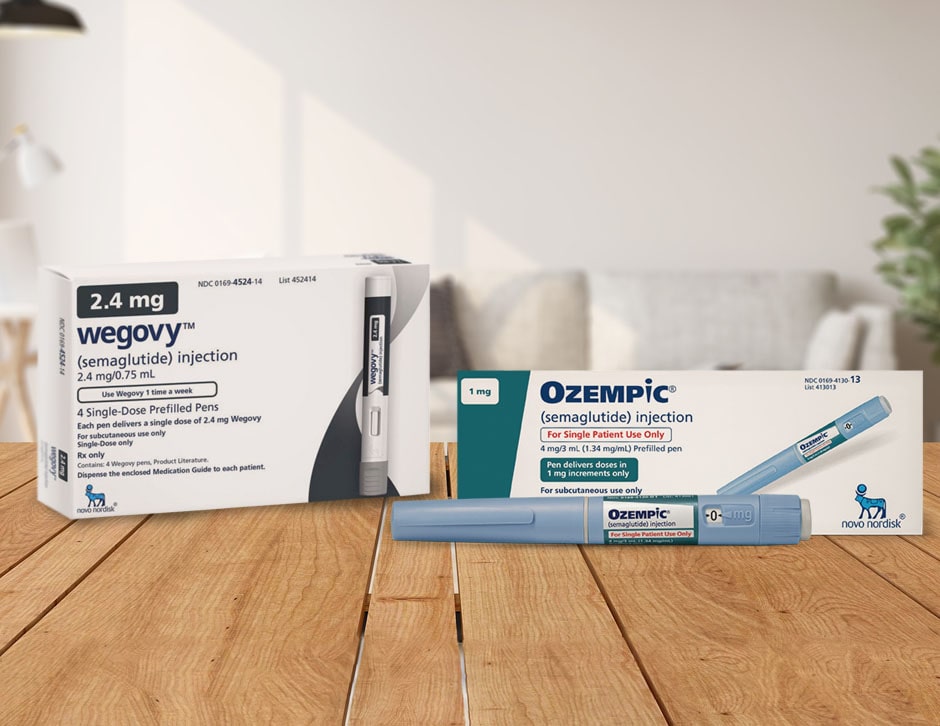
Quick overview of what we’ll cover in this blog post:
- Brief summary of the semaglutide-based drugs, Ozempic® & Wegovy®
- Similarities between them
- What makes them distinct
- Why one is FDA approved for weight loss and not the other
Chances are, you haven’t just heard of Ozempic®: you’ve read the press, know which celebrities are taking it, and you may already have the song from their commercial stuck in your head – “Oh, oh, oh, Ozempic!”
If so, you’re probably also familiar with Wegovy®, even though it doesn’t have a splashy commercial with a catchy remake of 1975’s “Magic” by Pilot.
The reason you’re likely familiar with both is for good reason. After all, both Ozempic® and Wegovy® contain the purported “miracle molecule” semaglutide as their main active ingredient.
But what’s the difference between these two medications? Why do they both have separate FDA approvals? These are just some of the questions we’ll answer below as we explore the contrast between Ozempic® and Wegovy®.
How are Wegovy® & Ozempic® similar?
Of course, to understand how different things are from each other, we must know their similarities.
Sure, we know both Ozempic® and Wegovy® contain semaglutide. But what does that mean, exactly?
Well, semaglutide is a GLP-1 receptor agonist. This means that it imitates the glucagon-like peptide (GLP-1) hormone, which is responsible for regulating hunger and insulin secretion. In turn, this slows digestion and helps reduce the amount of sugar released by the liver.
The results are improved insulin sensitivity and glycemic control (meaning cells are more responsive to insulin and better able to keep sugar within that “goldilocks” zone), as well as decreased appetite, lowered cravings, and feeling full earlier and for longer.
This causes individuals to reduce caloric intake, which is no small matter, as calorie restriction is the most powerful longevity intervention demonstrated to date. And for us humans, it also happens to be the most difficult to adhere to – until now.
As with any weight loss medication, there’s no such thing as a magic cure, and semaglutide is no exception. Maximizing Wegovy® and Ozempic® benefits requires a healthy diet, resistance training, quality sleep, and other lifestyle changes.
But even if you’re familiar with semaglutide, you might be surprised to hear that Ozempic® and Wegovy® are produced by the same company – Novo Nordisk. It may seem trivial, but Novo Nordisk manufacturing both is key to understanding the distinction between these medications.
How is Ozempic® different from Wegovy®?
The most glaring difference is their approved usages. While Ozempic® is FDA approved to treat type 2 diabetes, Wegovy® is FDA approved for weight loss. It’s important to note that these are not interchangeable: just as you can’t say Ozempic® to mean Wegovy®, neither should you use Wegovy to treat type 2 diabetes, even though both contain the same active ingredient, semaglutide.
But if both contain semaglutide with the same mechanism of action, why not have a single, unified brand?
After a deep dive into the FDA approvals, the answer becomes clear: dosages.
To put it simply, semaglutide isn’t ideal for everybody, and while some might be perfectly eligible to take semaglutide for type 2 diabetes, those same people may not be eligible to take it for weight loss. Specifically, Wegovy® is approved for people over 12 years old with a BMI of 30 or greater at a target dosage of 2.4mg weekly. Ozempic®, on the other hand, is approved for adults (18 years old or older) with type 2 diabetes at a target weekly dose of either 1.0mg or 2.0mg.
Novo Nordisk likely developed Wegovy® as a higher-dose semaglutide to optimize use for a larger portion of the general public (i.e non-diabetics) that seem to need a higher dose of semaglutide in order to achieve significant weight loss.
The View from Novo Nordisk
Still, wouldn’t it be simpler for Novo Nordisk to simply develop one brand to treat both conditions? When it comes to the FDA, it’s not!
The FDA tends to be finicky with their approval, and for good reason. Companies must specify how they intend to use their drugs and demonstrate effective, safe manufacturing for the masses.
With that in mind, let’s reconsider the dosages mentioned above: if Novo Nordisk settled on the target dose for Ozempic® as 2.0mg, then it’s likely that the FDA wouldn’t approve it for weight loss without some costly adjustments.
Even if we didn’t have Wegovy®, Ozempic® could technically still be used to facilitate weight loss. However, this would be an off-label treatment that would be harder to access than a drug manufactured and FDA approved specifically to treat weight loss: insurance companies are much less likely to cover an off-label medication, and in fact, this practice is often discouraged by watchdog bodies like the FDA and SEC.
That being said, drugs containing semaglutide are demonstrating expansive potential to address several different aspects of health and can be prescribed off-label by licensed medical professionals, at their discretion.
There we have the probable answer: the FDA likely wouldn’t approve of a company promoting off-label use of their medication. After all, it’s always best to leave approval to the discretion of prescribers.
Always discuss new treatment options and your reasons for wanting to start them with your healthcare provider. They will be able to guide you to the right solution, whether that be Ozempic® or Wegovy®.
Note: The above statements have not been evaluated by the Food and Drug Administration. This product is not intended to diagnose, treat, cure, or prevent any disease.
Unless otherwise noted, all information as presented here is sourced from Ozempic.com and Wegovy.com.
